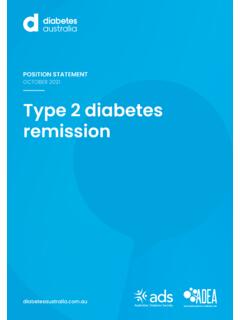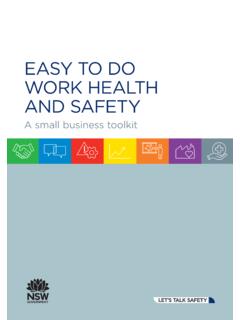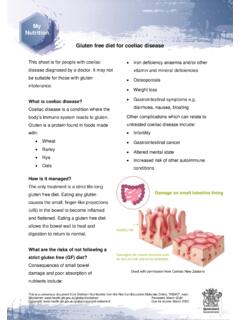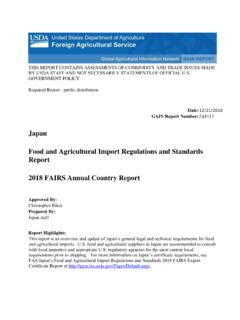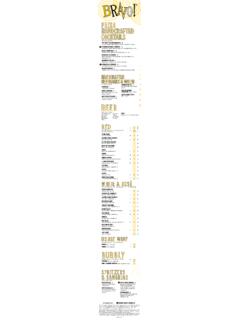Transcription of Position Statement - Diabetes Australia
1 1 Low carbohydrate eating for people with Diabetes August 2018 Position Statement2 Updated February 20191 ABOUT THIS Position Statement This Position Statement draws on the latest evidence and provides practical advice and information for people with Diabetes considering a low carbohydrate eating plan. Diabetes Australia has developed this Statement in response to enquiries from people with Diabetes , health professionals and the general public. 2 What is low carb eating? Low carbohydrate (low carb) eating refers to diets or eating patterns that restrict carbohydrate intake, principally in processed and packaged foods and drinks such as cakes, lollies, chocolate, chips, ice cream and sugary drinks; as well as breads, cereals, grains, potatoes, fruits and sugar. Usually, when restricting carbohydrates, people eat a higher proportion of protein and fats such as those found in meat, chicken, eggs, oily fish, avocados, nuts, oils and butter.
2 Some people choose to bulk up meals with low carb vegetables, such as cauliflower and it comes to low carb eating, there is no particular diet or standard Australian Dietary Guidelines provide general healthy eating advice and are a good starting point for people wanting to improve their eating habits. However, there is no one-size-fits-all approach to living well with Diabetes . Everybody is different. In recent years, low carb eating has gained popularity within the general population. Some people have found it useful for achieving weight loss. Low carb diets are popular because they are relatively easy to follow and heavily promoted in the carb eating has also gained interest for some people with Diabetes as one option to help lose weight and to assist in managing their blood glucose points1. For people with type 2 Diabetes , there is reliable evidence that lower carb eating can be safe and useful in lowering average blood glucose levels in the short term (up to 6 months).
3 It can also help reduce body weight and help manage heart disease risk factors such as raised cholesterol and raised blood pressure. 2. For people with type 1 Diabetes , a number of recent studies are reporting benefits of lower carb eating, however these studies are limited in their size and design and do not provide strong evidence of benefit. Diabetes Australia believes high quality, large scale, longer-term studies are necessary to further establish the effectiveness and safety of low carb eating for people with type 1 Diabetes . 3. All people with any type of Diabetes who wish to follow a low carb diet should do so in consultation with their Diabetes healthcare team. 4. People with Diabetes who commence low carb eating should monitor their blood glucose levels and, if necessary, talk to their doctor about the need to adjust their Diabetes medication to reduce the risk of hypoglycaemia (low blood glucose).
4 5. People with Diabetes considering low carb eating are encouraged to seek personalised advice from an Accredited Practising Dietitian experienced in Diabetes management. There are some practical considerations that need to be taken into account to ensure the eating plan is safe and enjoyable, provides adequate nutrition for general health, is culturally appropriate and fits into the person s lifestyle. 36. People with Diabetes considering low carb eating should be aware of possible side effects (such as tiredness, headaches and nausea) and seek advice from their health care team if Low carb eating may not be safe and is not recommended for children, pregnant or breastfeeding women, people at risk of malnutrition, people with kidney or liver failure, or those with a history of disordered eating or some rare metabolic People with type 1 Diabetes may experience sudden drops in blood glucose levels and be at a higher risk of hypoglycaemia when following a low carb eating plan.
5 They should talk with their Diabetes healthcare team before starting low carb eating. 9. All Australians, including people who choose to follow a low carb eating plan, should be encouraged to eat foods proven to be beneficial to good health. These include whole fruit and vegetables, wholegrains, dairy foods, nuts, legumes, seafood , fresh meat and All Australians should be encouraged to limit their intake of foods that are high in energy, carbohydrate or salt, including processed foods such as sugary drinks, chips, cakes, biscuits, pastries and IntroductionMedia coverage and public awareness have helped promote the popularity of various approaches to low carb eating in recent years. Healthy eating for people with Diabetes can encompass a wide range of eating approaches. Healthy eating should assist a person with their Diabetes management, provide adequate nutrition for a healthy life, be safe and enjoyable, culturally appropriate, sustainable and fit into the person s lifestyle.
6 Diabetes Australia does not promote or encourage any single diet or eating plan or any particular Diabetes diet . Every person with Diabetes needs a personalised approach and support to have the healthiest eating plan and this may change over their lifetime with Australia relies on strong scientific evidence before making specific health and nutrition recommendations for people with Diabetes or those at risk. Evidence is usually based on the National Health and Medical Research Council (NHMRC) hierarchy of Diabetes Australia believes that people with Diabetes should make their own, informed choices about their Diabetes management (including eating plans) in consultation with their Diabetes healthcare team. We recognise that long-term studies can take years to be designed, conducted and published and, in relation to low carb eating for people with Diabetes , we will continue to review and update our advice based on new evidence as it becomes available.
7 Diabetes Australia regards healthy eating as a key issue for people with Diabetes that requires more research. We have developed this Position Statement based on current evidence and in response to enquiries from people with Diabetes , the general public and health professionals. For people with type 1 Diabetes , there is not yet enough evidence to recommend low carb eating for everyone. Low carb eating is not recommended for children (anyone under the age of 18) or for people with specialised nutritional requirements, as outlined in section 5 of this Position Statement . We recognise that some people with type 1 Diabetes may choose to follow a low carb eating approach and they should be supported in this. We encourage these people to consult their Diabetes healthcare team. For people with type 2 Diabetes , recent evidence has shown that, in the short term (up to 6 months), lower carb eating can help with the management of type 2 Diabetes .
8 However, this benefit is no longer evident after 12 ,3 In addition to promoting weight-loss, reducing carbohydrate intake can provide health benefits that include lowered average blood glucose levels and reduced risk of heart disease. Some benefits can be achieved independent of the amount of weight-loss ,452. Carbohydrates and diabetesDairy foods (such as milk and yoghurt), fruit, wholegrains and starchy vegetables are all nutrient-rich sources of carbohydrate and provide some protein, fat and fibre as well as vitamins and minerals. The body uses these other nutrients to stay healthy and perform at its best. Carbohydrates/sugars added in the making of foods or drinks are generally less healthy. There is often added sugar in foods and drinks and in some cases, a lot of added sugar. This includes sugary drinks, cordials, lollies and many processed foods.
9 While these foods are also sources of carbohydrate, they provide little, if any, nutritional value. What are carbohydrates? Carbohydrates are parts of food our body breaks down into glucose which it uses for energy. They include starches, such as those found in bread, potatoes and rice; as well as sugars, such as those found in fruit, milk and yoghurt, sugary drinks, cakes, biscuits, pastries, icecream and are the major source of energy for the body. However proteins and fats also provide a source of energy. When carbohydrates are digested, they are broken down into a sugar called glucose, which provides energy for every cell in the body cells in the muscles, the brain, the heart and other organs. Glucose allows all our cells and organs to grow and work as they should. Healthy carbsLess healthy carbs6 What is a sugar?
10 Sugar is a type of carbohydrate. The most common sugars are sucrose (from sugar cane), fructose and glucose. Glucose is the form of sugar that is used by the body for energy. Glucose is carried around the body in the (glucose)To use glucose as energy in the cells, we need insulin to help transport the glucose from the blood supply into the cells. In people with type 2 Diabetes , the insulin does not work as well as it should and often the body does not make enough insulin. As a result, some of the glucose stays in the blood causing high blood glucose levels. About one in every four people with type 2 Diabetes need insulin people with type 1 Diabetes , an autoimmune reaction destroys the cells that produce insulin. All people with type 1 Diabetes need insulin either by multiple daily injections or by an insulin pump, so that the glucose can be used by their Common definitions of low carbStudies looking at the effect of low carb diets on Diabetes use varying definitions of carbohydrate content.

